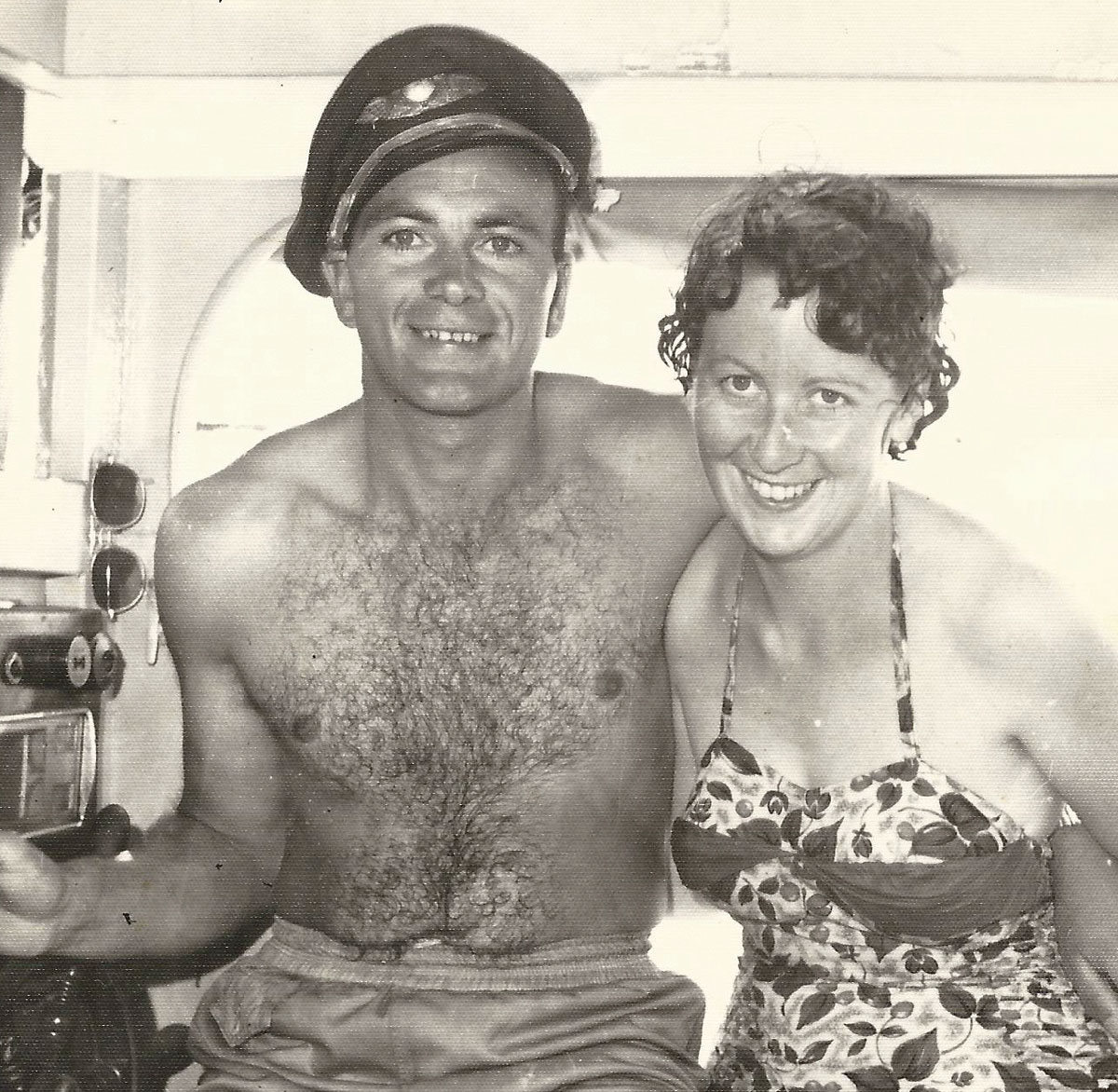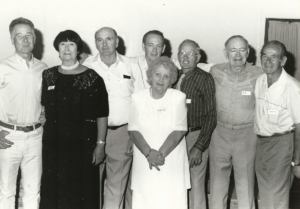John and June on their honeymoon.
This week’s local legends have been a part of the Twin Towns community for eight decades, and June and John Spencer continue to make an invaluable contribution. June was born in June 1937, in Harden, to farmers Sylvester and Lilian Davis.
She would commence her education by correspondence, with her mother supervising her learning. Her education would soon commence at an actual institution, with June transferring to the Lady of Mercy College at Goulburn. June put it simply when she said “I hated it.” Life on the farm, surrounded by her family, both of which she loved dearly, contrasted sharply with the isolation of Goulburn; a whole other world compared to farm-life of Jugiong.
Eventually, June would return home to the comforts of small-town life, resuming her education at St Columba’s in Harden. The journey between Jugiong and Harden, in conjunction with the lack of public transport, meant that June would weekly board with two of her sisters who had been working in town.
A person who enjoyed education, June would complete her intermediate certificate, and return to the farm to assist her parents, both of whom were in ill health. John, the son of Binalong butcher Charlie Spencer and his wife Ethel, was born in May 1937, at Crown St Women’s Hospital. Raised alongside the Butchery in Binalong, John would attend the local public school, before moving onto Murrumburrah High School.
The introduction of the bus route meant John was able to attend High School, with the bus collecting students from Binalong, Galong, and out towards Boorowa. He remembers with great amusement a child from Galong being threatened with banishment from the bus, should he continue his questionable behaviour. The child in question failed to take heed, and soon found himself making the long, lonely walk home.
The Second World War also left the young John with lifelong memories. He has distinct memories of a troop of American Soldiers camping at Bridge Flat overnight. He and his brother George paid the troops a visit, where they were offered bread and butter by the Yanks; butter, they informed him, that had come across the Pacific from the United States. The day the war ended was one of great celebration, with the students released early from their class and parading around the town making a great deal of noise. The two would meet at a dance in Harden in 1956.
Ian and Shirley, Son and daughter of Robert, John, Elsie, Robert, Merv, Bert and Charlie Spencer.
Both June and John had an affinity for the dances, all around the region, with June remembering fondly her and her girlfriends hiring a taxi, usually driven by Pat Brown, and travelling the countryside to numerous dances.
They would marry in 1960, at St Anthony’s Church in Harden, honeymooning on the Gold Coast which, at the time, was far from the tourist haven it is now known as. As a young man, John became a fan of travelling, visiting the major cities, even venturing as far as Coolangatta with some of his mates. He often attended sporting matches in Sydney, using the extensive tram work the city had at the time to get around.
John scoffs at the fact Sydney is now rebuilding their light rail network, given how great their old system was. June also saw her fare share of travelling, visiting Sydney and Melbourne, although she was restricted by the fact that she was a woman. She believes that young women today wouldn’t believe how little freedom June’s generation had. Never a fan of school, John finished at the age of 15, and commenced work as a slaughterman for his father’s butchery, earning a £1 a week in keep.
They would expand the business, acquiring premises in Harden and Murrumburrah, from Jack Ryan. With the demands of these two stores needing to be met, the newlyweds returned to Harden from Binalong, where they had lived for a short while.
When the business was sold to Jack Webb, John continued to work under him. Over the next decade, June and John had four children, Greg, Barry, Anne and Johnny. June jokes that John could handle the guts and gore that came with being a slaughter man, but a nappy proved too much. In 1970, John commenced work at the newly-built Cootamundra abattoir.
He would work for a time in a large chiller, before moving into a larger room. Whilst there, he worked with pigs and sheep, with his bacon earning a first prize at the Sydney Royal Easter Show. Whilst raising her children, June became involved with the school tuckshop, and would spend weekends traversing the countryside, ferrying her children from carnival-to-carnival. Basketball, netball and football occupied much of her time. June’s son recently pointed out the difficulty of having to transport his child around on weekends, much to her amusement.
She would also become involved with St Lawrence’s at Galong, with her father becoming one of its first residents. June would often visit him, and slowly became an integral part of the staff there, assisting in every way possible. She would volunteer 21 years of her life to the care of the elderly. Upon the Harden Abattoir’s opening in 1975, John joined as one of the first two employees, the other being Billy Stevenson.
His extensive experience in butcheries and abattoirs left John with his fair share of stitches and scars, along with some unique memories. More than once, John found himself in a situation that threatened his safety. One such situation saw he and Billy walking down the back of the abattoir when they began to hear a whizzing sound.
They soon discovered the sound was that of bullets being aimed at tin cans by a man who was, clearly, a poor marksman. His time in the industry also meant he saw it change drastically over the years. When he first began, John recalls having to slaughter in accordance with the sleeping patterns of flies. Although lighting a fire using cow dung was often used to deter the insects. One of the most tragic aspects of John’s career came with the death of his manager, David Wright, in a car accident in Jugiong.
“He was a very caring man,” June says. “When John was sick, he would come and visit… see if there was anything he could do.” “David was more than a manager, he was a friend,” John agrees. In more recent times, June has become involved with a multitude of community groups, assisting with CanAssist, since it’s inception, assisting with Meals on Wheels, the Hospital Auxillary, and serving as the President of Ladies’ Golf for a period of time.
The couple has also travelled extensively, caravanning to Northern Australia at one point, and driving extensively up and down the east coast. They say they considered at one point or another if they should move to another town, with three simple criteria set: it needed a TAB, a bowling club and had to have a couple of thousand residents.
They never did end up relocating. But June jokes that every time they travel, every stop they make seems to be in close vicinity to a TAB; a pure coincidence according to John. John and June recently celebrated their 80th Birthdays, in the company of over 100 family and friends. They didn’t want such a celebration, but were convinced by their daughter who mentioned the merits of making the gathering into something of a family reunion.
The gathering, held over the June long weekend at the Harden Country and Bowling Clubs, was simply “lovely” according to June.
Thank You for being Local Legends


